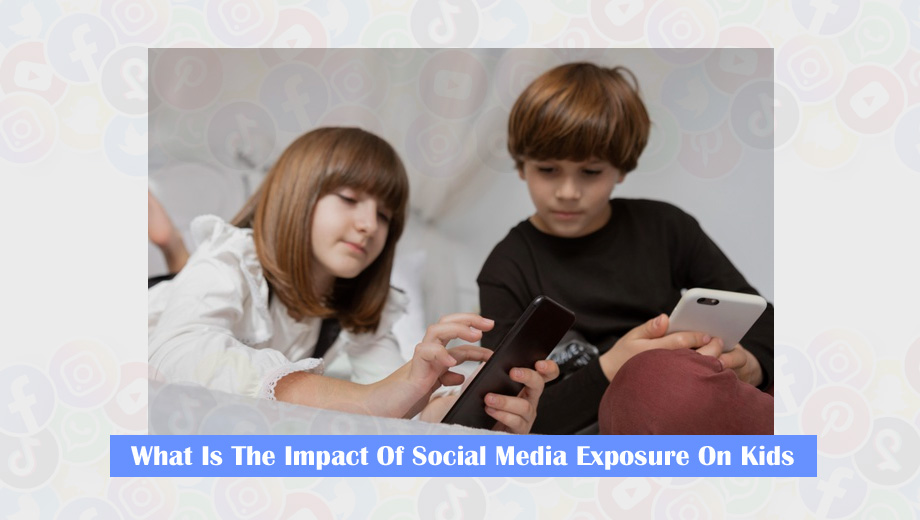Using social media sites is among the most common activities of today’s youngsters. Any site that allows social interaction is considered a social media site like Instagram, Facebook, and Twitter. These sites offer today’s youth a gateway for communication and entertainment and have grown exponentially in past years. For this reason, parents must become aware of the nature of these social media sites, as not all of them are healthy environments for young kids and teens.
The impact of the media on the psychosocial development of kids is profound. Thus, doctors must discuss their child’s exposure to media with parents and guide age-appropriate use of all media, including radio, television, music, video games, and the Internet.
This statement’s objectives are to explore the positive and negative effects of media on kids’ mental and physical health and identify how doctors can counsel patients and their families and promote their healthy use in their societies.
What We Know:
Here are facts about digital media use.
- About 75% of teens and kids own a smartphone. They can access the Internet, watch videos and TV, and download interactive applications.
- 76% of teens use at least one social media where more than 70% of teens visit multiple social media sites, like Instagram, Facebook, and Snapchat.
- 25% of teens are “constantly connected” to the Internet.
- 4 of 5 families own a device used to play video games.
Everything has both positive and negative impacts: Let’s look at those.
Positive Impact of Social Media on Kids:
- Spending time online is vital for the young generation to pick up the required technical skills they will need to explore through the future.
- Students are motivated to learn from their peers as it has introduced a more peer-based learning method.
- It is not just a platform or media for socializing, but kids have found a new way to represent themselves creatively and interact and learn with an audience.
- Social media is a tool to communicate and also an essential part of the lives of young adults.
- It has been observed that social media makes users more considerate, empathetic, and relationship-oriented.
- Social media sites provide introverted kids a boost of confidence and a chance to open up over the Internet.
- Many kids find it easier to talk to people in person after communicating with them over social media platforms. It also helps them interact with people worldwide, understanding other cultures, music, food, and more.
Negative Impact of Social Media on Kids:
- The well-known impact of social media is the addiction it creates. Continually checking the news feed of the various social media sites becomes a habit.
- This social media addiction disrupts other activities, like sports, school work, study, and other productive routines.
- Psychologists have observed the harmful effects of social media for a long time on children’s mental health.
- Screen relationships also detract from real-life relationships and social skills in youngsters and teenagers.
- While some kids or teens are affected by the pressure of reacting to their friends’ posts or responding to messages, others fear not being in the social loop, called fear of missing out.
- Obsession with posting self or constant updates and selfies on social media raises narcissism in kids. Their behavior and moods depend profoundly on how appreciated their posts are on social media, and they go into stress when they don’t get the attention they expect.
- Having their social pages makes kids more self-centered. This condition is a precursor to dysfunctional emotional needs later in their life and a lack of empathy for others.
Protect your kid:
You can take steps to encourage responsible use of social media and limit some of its harmful effects. Consider these tips:
Set reasonable limits:
Talk to your kid about how to avoid letting social media conflict with their activities, meals, sleep, or homework. Set a bedtime routine that avoids electronic device use, and keep cell phones and tablets out of kids’ bedrooms.
Monitor your kids’ accounts:
Let your kid know that you’ll be regularly checking their social accounts. You might try to do so once a week or more.
Explain what’s not Fine:
Control your kid from spreading rumors, bullying, gossiping, or damaging someone’s reputation online or differently. Talk to your kid about what is safe and appropriate to share on social media.
Encourage more face-to-face communication with friends:
This is especially important for kids nowadays vulnerable to social anxiety disorder.
Talk about social media:
Talk about your personal social media habits. Remind your kid that social media is full of unrealistic and virtual images. Ask your kid how they are using social media and how it makes them feel.
How Parents Can Make The Most Of Kids Social Networking:
- Educate your kid about the risks of social media and explain how it can be harmful and helpful. Inform your kid about the danger of “oversharing” for reference.
- Encourage your kid to spend more time in actual communication than online communication.
- Tell your kid to spend more time in real-life activities and friendships. Real face-to-face interaction is warmer and more profound than online relations. Your kid learns more social skills in relating to and having physical communication with their friends. Online friendships do not teach your kid to listen to detailed vocal cues, adapt to different personalities, interpret body language and skills that are often necessary to survive in the real world.
- Suggest your child to benefit from social networking to improve learning, not for hanging out and spreading nonsense to collaborate with fellow students but to collaborate with fellow students. Teach your kid to distinguish between what has something and what is just trash. It would help if you warned them not to engage in the darker side of social networking like stalking, cyberbullying, sharing inappropriate materials, etc.
- Instead of constantly telling your kid to stop going online, encourage your kid’s passion or interest, and help him discover his other interests and train them. Like sports, crafts, playing a musical instrument, writing, etc. Schedule these real-life activities, or support him when he is engaged in non-online activities that he is passionate about.
- Control your kid’s online activity to protect him from online dangers and predators. You should be constantly aware of what your child does online or in front of the computer; do not be fooled that your kid is online for studying or for school research.
- If your child feels anxious about how other kids live their life on social media (as you can see nowadays), remind your child that his/her friends’ postings are curated and do not represent the whole story of their life. Tell him that they are probably just sharing the best parts also, encourage them to spend less time on social media if it makes her unhappy.
- Just lurk or be a silent, watchful friend when you join your child’s social network. You may like but avoid commenting as this may turn your kid or their online friends off.
- At last, use social network sites in moderation.
Final Words
It’s also essential for families to have regular discussions on using social media safely and responsibly. When families explore the world of social media together, a kids’ or teen’s online world becomes much more manageable.

